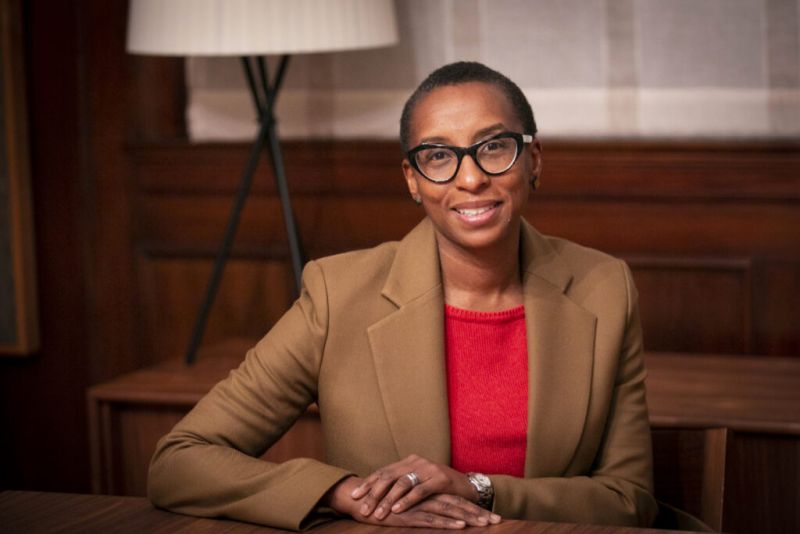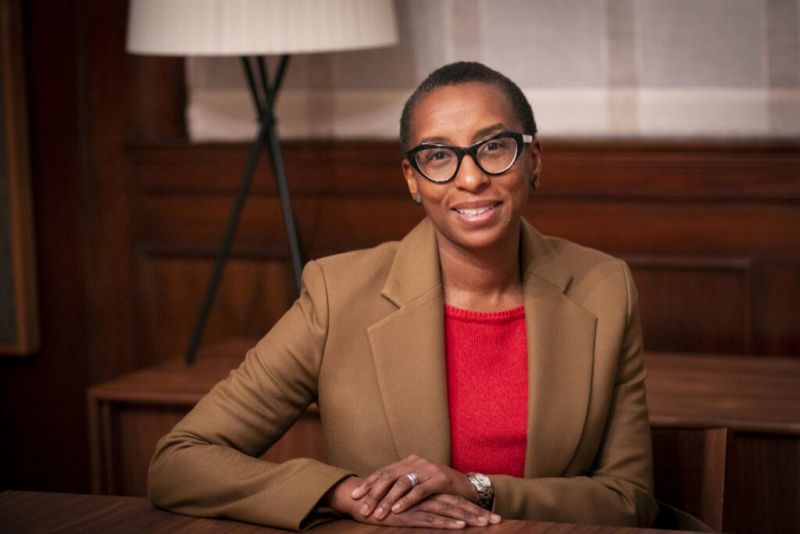
Amid a lifetime of navigating such experiences, Professor Gay embraced the milestone with an introductory speech that celebrated her Haitian-born parents and their faith in the power of education then gently reminded her fellow academics of the toxic political atmosphere surrounding them.
Today’s high-tech world offers “endless access to information”, she told her colleagues in a jammed foyer of Harvard’s Smith Campus Center. “But it’s getting harder to know what to believe.”
Some of the many advocates of equity who long stood behind Professor Gay made it clear that they were both overjoyed by Harvard’s decision and by its potentially transformative power over all of US higher education, and yet were fully aware of the long pathway to equity that still lies ahead.
They included Gloria Blackwell, chief executive of the American Association of University Women, which awarded Professor Gay a postdoctoral fellowship nearly 20 years ago at Stanford. Professor Gay’s fellowship was one of 13,000 that the association has funded since its founding in 1881, and her career success “is quite gratifying”, Ms Blackwell said. “Harvard is the gold standard, obviously, for so many people, not just in their own country, but around the world.”
But, Ms Blackwell said, while boosting equity requires removing hurdles all along human and career pathways, the final step into a college or university presidency still looms as a particularly tough one. The office of provost is the most common entryway to the presidency, and women now account for 40 per cent of the provosts at the 130 US universities ranked as R1 – those with the highest level of research activity. Women, however, have managed to take only 22 per cent of the top jobs at those 130 campuses. And only 5 per cent of campus presidents are black women, according to a report this past year by Ms Blackwell’s association and the Eos Foundation.
“It’s not just a glass ceiling – it really is a concrete ceiling when you’re looking at women of colour,” Ms Blackwell said. “Having an institution like Harvard really take a stand and put a black woman at the helm – this venerable, revered institution – we hope will send a signal to so many of the other institutions who are still enmeshed in recruiting and procedures and governing boards that are not inclusive.”
Harvard does appear to have taken a systematic and sustained approach in its pathway to putting Professor Gay in its top post, said Andrea Silbert, president of the Eos Foundation, which funds work in areas of gender and racial diversity. The university said it had chosen its new president through a five-month search process that assembled and considered 600 nominees. Yet, Ms Silbert said, the university also appears to have guided Professor Gay into positions that would improve her readiness for the presidency.
The dean of arts and sciences heads the university’s largest and most academically diverse collection of faculty, and Professor Gay’s experiences in that job included handling several high-profile sexual harassment complaints against prominent Harvard professors, and overseeing revisions to promotion and tenure policies designed to reduce biases.
“I think Harvard felt like it needs to lead by example,” Ms Silbert said, “and make sure that everybody who goes to Harvard feels like they are represented at the very top.”
But up to the moment it actually happened, said another leading expert on racism and diversity in higher education, Marybeth Gasman, the possibility still felt distant. The professor of education at Rutgers University said she was in an online meeting with two black women when the selection was announced. “We were all shocked,” said Professor Gasman. “Not shocked that someone so highly qualified would be president of Harvard, but that the institution finally decided to make this decision.”








